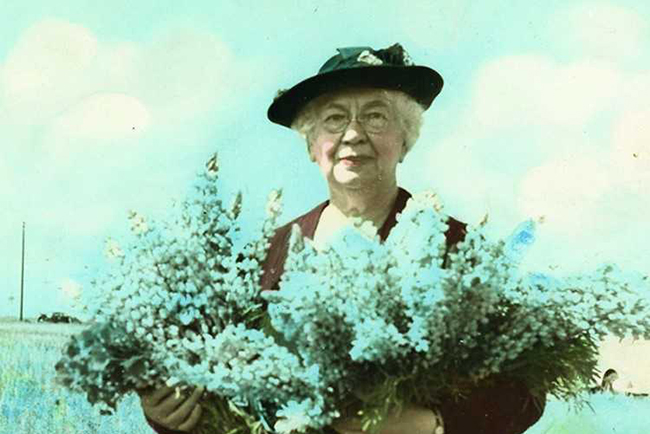
Lettie Cowman left a legacy of faith and inspiration as her devotionals drew readers in, becoming close companions on a spiritual journey.
By Susie Hawkins
You may have never heard of Lettie Cowman, but hopefully you are familiar with her beloved devotional books, Streams in the Desert and Springs in the Valley. These two books, originally published in 1925 and 1939 respectively, have been perennial best-sellers, gracing the nightstands and desks of men and women for generations. What made them so timeless, and who was the woman behind these devotional works?
Lettie and her husband Charles left Chicago to serve as missionaries in Japan in 1901. Charles became one of the founders of a mission society, which was soon established in Tokyo. They partnered with Japanese believers, holding frequent evangelistic and church meetings across the country. Serving in Asia from 1901 to 1917, they worked diligently to spread the gospel in Japan and China. Their efforts were successful. But unfortunately, after a few years, Charles began to develop serious health problems.
“Lettie Cowman found comfort in not only the promises of God but also in encouragement from other believers who had traveled similar roads of difficulty.” — @SusieHawkins1 Click To TweetThe time came when the Cowmans had to face the possibility of returning home. This was not the future they expected, and troubling doubts and questions filled their minds and hearts. Lettie Cowman began to journal various quotes and Scripture verses meant to strengthen their faith and help deal with the inevitable disappointment and heartache of their broken dreams.
Devotional writing in a tumultuous world
The Cowmans returned to the States in 1918, weary and discouraged. From that point on, Cowman sat by her husband’s sickbed, nursing and caring for him until he passed away several years later. The 1920s were a turbulent time in American culture, marked by economic prosperity, jazz bands, flappers, prohibition, and eventually the stock market crash.
It was against the background of a growing interest in evolution, made popular by the writings of Charles Darwin, that her devotional, Streams in the Desert, was published. This was also the year of the Scopes Monkey Trial—the legal battle between John Thomas Scopes, a high school science teacher accused of teaching evolution, and the state of Tennessee. It was illegal at that time in Tennessee for public schools to teach anything other than the biblical story of creation.
The Scopes trial quickly gained national attention as a showdown between fundamental Christianity, which taught the biblical account of creation, and evolution, which was the scientific theory that explained the development of humanity through natural selection. There was no question that Darwinism and atheism had captured the imagination of the American public, and bookstores could not keep books on modern science and evolution in stock. But interestingly enough, Cowman’s Streams in the Desert appeared to hit a nerve with the American public and unexpectedly also became a best-seller, indicating there was still a hunger for books on faith. Several years later, she published Springs in the Valley, a companion volume. A prolific writer, Cowman also published seven other books.
A legacy of devotional writing
It’s important to take a close look at Cowman’s devotional content because that is what made her work so unique. Her inspirational insights developed during their dark times on the mission field in Asia as well as the years spent caring for her invalid husband. Cowman continued to add to her collection of various quotes, poems, and meditations from well-respected Christian authors such as F.B. Meyers, A.B. Simpson, C.G. Trumbull, Harriet Beecher Stowe, Frances Ridley Havergal, and Hannah Whitall Smith, among others. Her references indicate the eclectic and extensive nature of her reading. She found comfort in not only the promises of God but also in encouragement from other believers who had traveled similar roads of difficulty.
Julian of Norwich, a medieval mystic, was one of the first writers of the English language and spoke often of suffering. Cowman quotes Julian in the foreword of one of her lesser-known devotional books, Handfuls of Purpose. Julian wrote, “He said not, ‘Thou shalt not be [tempted], thou shalt not be afflicted,’ but He did say, ‘Thou shalt not be overcome.” This quote encapsulated the essence of Cowman’s interests and devotional topics.
“Lettie Cowman introduced a new format for the devotional genre. She was the first person to put her devotions in a calendar form.” — @SusieHawkins1 Click To TweetCowman also introduced a new format for the devotional genre. She put her devotions in a calendar form, which had not been done before. She organized each entry with the date, then introduced a Scripture verse or passage, a corresponding meditation or thought, and then a prayer. Cowman clearly expected her readers to do what they already knew to do—to spend time in prayer and Bible reading at the beginning of each day. She also expected her readers to reread her devotionals yearly.
Compassionate writing
Cowman wrote in a manner that drew her readers in, becoming close companions on a spiritual journey, seeking comfort and assurance from the Bible. She refers to her reader as “anxious one,” demonstrating her compassion for those going through trials such as herself.
The titles of her two well-known devotional books reflected her overall theme, picturing the biblical metaphors of spiritual thirst and hunger. Introducing Streams in the Desert, Cowman quotes Isaiah 35:6, “…water will gush in the wilderness, and streams in the desert” (CSB). In her introduction to Springs in the Valley, she writes, “He sendeth springs into the valleys, which run among the hills,” quoting Psalm 104:10. She adds, “In the pathway of faith we come to learn that the Lord’s thoughts are not our thoughts, nor His ways our ways….” She dedicates the second volume, Springs in the Valley, to her “fellow travelers on the desert highways of life.”
Hope for the days ahead
Cowman’s devotional books prove the staying power of the written word. While the Cowmans’ short ministry in Asia was moderately successful, the durability of her devotional books has withstood the test of time. Her publishers write, “Streams in the Desert has become a daily devotional classic…It has appeared in more than a dozen languages…Its ministry is worldwide, unhindered by national, political, or geographic boundaries…Streams in the Desert continues to bring its spiritual refreshment, its word of encouragement and inspiration just suited for the moment’s need…Streams in the Desert is more than a book—it is a living word of confidence and assurance, God’s message for the day.”
Cowman is yet another woman in church history who leaves a legacy of faith and inspiration to those who come after her. If you are an “anxious one” in the desert or in the valley, begin this devotional journey with Cowman. You will find encouragement and strength for your own journey and hope for the days ahead.
Other women in church history articles:
For permission to republish this article, contact Marissa Postell Sullivan.

Susie Hawkins
Susie lives in Dallas and has been actively involved in ministry as a pastor’s wife, teacher, and volunteer. A noted author, Susie holds a Master of Arts in Christian Leadership and a Master of Arts in Theology from Criswell College.











